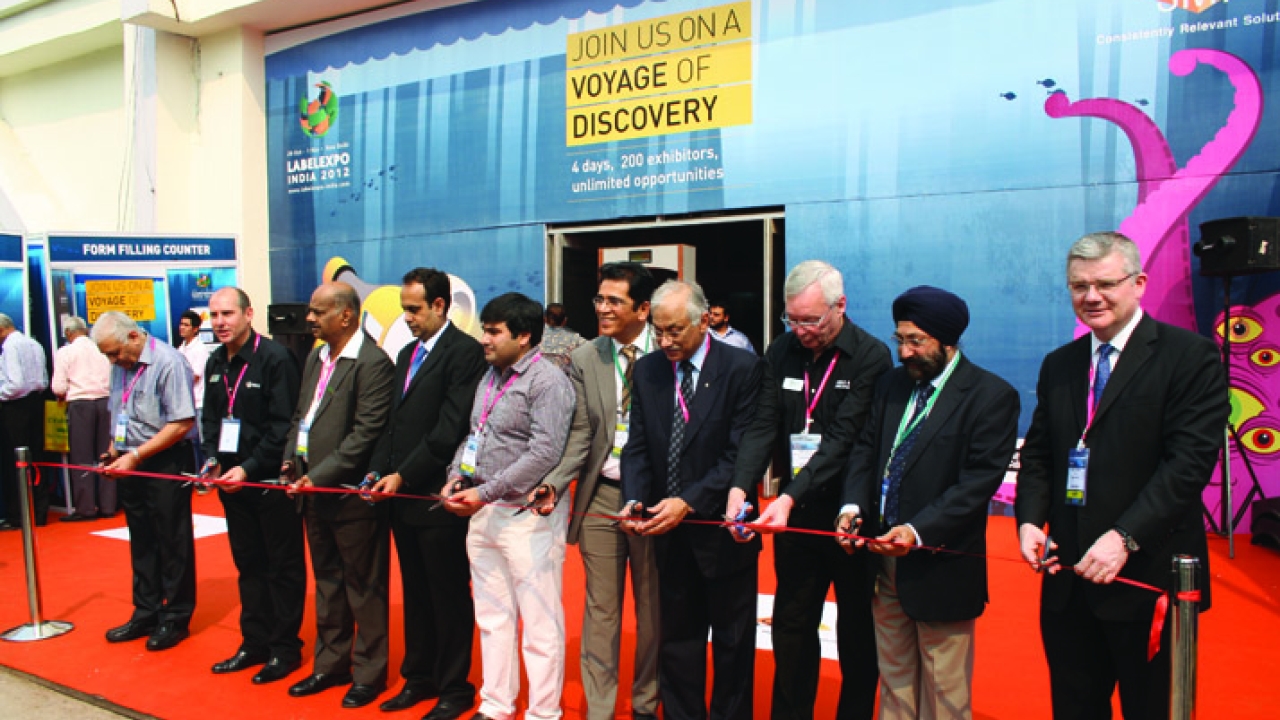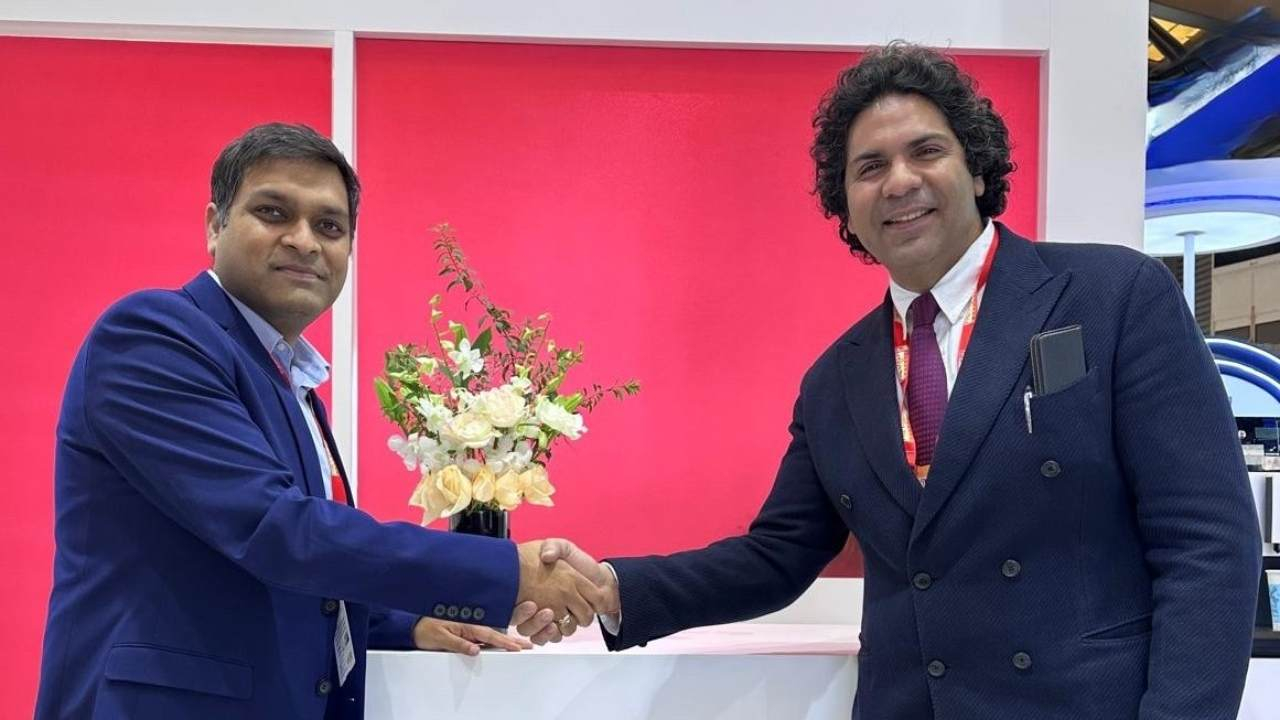India emerges

Labelexpo India 2012, held in New Delhi from 29 October to 1 November, exceeded all expectations in visitor and exhibitor numbers, Carol Houghton reports
Having grown by 10 to 15 percent in the last five years, the Indian label market is now ready for bigger brands to grow their business. Over 200 local and international companies exhibited at Labelexpo India, including 49 first time participants – evidence the region has huge growth potential.
The show attracted 8,049 visitors – up by 33 percent from the event in 2010 – and event organizer Tarsus Group reported that 53 percent of exhibitors confirmed their participation at Labelexpo India 2014 before the show closed.
Many exhibitors reported on-site sales, including Nilpeter and Mark Andy each selling two machines. Jacob Landberg, sales and marketing director, Nilpeter, commented, 'India has tremendous potential to be one of the fastest growing markets in the world'.
Influencing the industry
The Foreign Direct Investment (FDI) legislation is expected to take effect soon, pushing growth within the label and packaging sectors. Infrastructure will need to improve to facilitate the activities of multinational retaileers and this will create opportunities for added-value track and trace and security labels.
Increased demands for quality and color consistency will increase the demand for inspection equipment. Jürgen Bräu, head of inspection technology, Erhardt + Leimer, predicts that FDI will ‘really open up the market and help the label industry.’ He expects it will create an ‘immediate fight between printers to get the new jobs.’ Indian companies now have a greater awareness of the added value quality inspection provides how this offers a point of differentiation against competitors, Bräu believes.
Aviram Vardi, marketing manager, AVT, reflected, ‘Most AVT machines installed in India are on rewinders but the country is waking up to the trend of inline inspection. More and more units are being installed on the printing press as the money, time and waste savings that can be made by getting it right on the press are realized’.
He reported that the requirements for inspection in India are increasing as more goods are exported to Western countries. The security market is also growing, as features such as unique numbers, barcodes, QR codes and datamatrix become common practice.
In pharmaceuticals, new regulations are expected to create demand for 100 percent inspection. It is estimated that one third of recalls in this sector are packaging related.
Product launches
More than 20 presses were demonstrated live on the show floor, including some seen for the first time.
Nilpeter India showed a 10-color FB-3300S flexo press and a new gravure unit for its FB3300 press line. Alan Barretto, managing director, Nilpeter India, commented: ‘We see a shift in the market. The customers are looking for customization to differentiate themselves in the labels and flexible packaging they supply. Our presses are custom-made for special applications. It is all about the ability to add unique combinations and features such as gravure, hot foiling, die-cutting, etc.’
Another important launch was Multitec’s Ecoflex VSi with UV flexo option for the labels and flexible packaging market. It has bigger impression cylinders and chill drums than the its predecessor, the Multiflex, which was designed primarily for pressure sensitive labels. Amit Ahuja, director, explained: ‘People want to diversify their portfolio – not just offer labels.’
The Ecoflex has a short web path and can make fast changes between material caliper. Print cylinders and anilox rolls can also be quickly changed without tools. In addition, a servo infeed provides tight registration.
Webtech launched a new generation flexo machine, the Flexomaster. It features a modular design, quick mount plate cylinder, tool-less operation, sliding type ink cassettes, dual tension control, synchronized infeed with separate drive, multiple output options and the possibility of combination printing with offset, gravure or foiling.
Gallus Group participated with its own regional sales and service organization, Gallus India. ‘The growth of a broader middle class in India is having a long-term impact on packaging markets and the demand for packaged goods,’ explained the company. ‘These developments, in turn, are boosting demand for high-quality labels and local manufacturing facilities. Gallus is therefore expanding its network of sales and service centers in India to ensure a local service for label printers in India.’
Mark Andy ran live demonstrations of its Performance Series P5 press. The company’s Mike Russell noted that ‘India has caught up with the rest of the world in terms of flexo.’ There is a need to raise the price paid for labels, however, to support further investment in capital machinery. In terms of technology, the company said requests for servo are starting to come through. This is part of a new trend in ‘stepping up’ as printers grow and begin to invest in more complex, sophisticated presses.
Nuova Gidue showed an M1 370 mm. Federico d'Annunzio, managing director, said, ‘We are showing a geared press to fill the need in the market for an entry level machine.’ However, he added: ‘India is more advanced than people think; it is producing the same as the Western markets, using the same materials and equipment; but it needs to improve quality and productivity.’
Omet showed its Xflex X4 for the first time at Labelexpo India. It expects 2013 to be a big year for sales in India. Marco Calcagni, sales and marketing director, explained, ‘An improved infrastructure will get things up to international standards so the requirement will grow for “up-to-speed machines” in order to achieve this.’ He believes FDI will be the driving force.
Kumar Labels launched its NB-330 intermittent/full rotary die-cutting machine under its new brand, HassleFree Technologies. Described by the company as ‘an entry level alternative to flat-bed, primarily for the digital finishing market’, the NB-330 received five orders at the show. Two of these orders were from overseas.
The machine includes a single common magnetic cylinder for all repeats from 50mm to 340mm, job parameter memory for 100 jobs, touch screen control panel servo control. The NB-330 has audible alarms and stops at paper breakage, paper end, registration shift, matrix breakage or change in pressure – meaning it can be set-up and left unattended, allowing the operator to run more than one machine at a time. It can reach speeds of over 200 impressions per minute.
Digital
Digital capabilities had a strong presence at the show. Epson India launched the SurePress to complement – rather than replace – conventional technologies. S M Ramprasad, deputy general manager – consumer products group, Epson India, said it will ‘give converters the flexibility they need for short-run jobs.’ He expects the need for digital to grow as the Indian market adopts more niche and customized products.
Xeikon displayed a 20in 5-color 3050 machine which will be installed at Better Label, in Chennai – the first Xeikon machine with this configuration in the Indian market.
Durst launched the Tau 330 UV inkjet label press, based on the 165mm-wide Tau 150 8C machine. It offers a 330mm web and is capable of print speeds of up to 50 linear meters per minute. Maximum hourly output reaches over 1,000 sq/meters. The Tau 330 comes with a standard CMYK configuration that can be upgraded with white ink, orange and violet process colors.
However, the company reported a slow digital uptake in India. ‘The Indian market prefers simple letterpress but things will change quickly in the next few years.’
Caption: (L-R): Arun Berry, president of the Delhi Printers’ Association; Roger Pellow, managing director, Labelexpo Global Series; Ramesh Deshpande, hon. secretary, LMAI; Ajay Mehta, director, SMI Coated Paper, Badish Jindal, national president, Federation of Associations of Small Industries of India (FASII), N. Delhi; Vivek Kapoor, president, LMAI; Veerendra Malik, (Digital Impressions) AIFMP representative; Mike Fairley, director of strategic development, Tarsus Group; Harveer Sahni, managing director, Weldon Celloplast; Doug Emslie, group managing director, Tarsus Group
This article was published in Labels & Labeling issue 1, 2013
Stay up to date
Subscribe to the free Label News newsletter and receive the latest content every week. We'll never share your email address.

